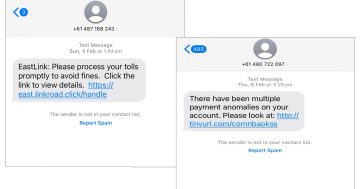 The Commissioner for Consumer Protection has set out the rights a consumer has should someone come knocking, texting or calling them to sell something.
The Commissioner for Consumer Protection has set out the rights a consumer has should someone come knocking, texting or calling them to sell something.
According to the Commissioner, Gary Newcombe, (pictured) it’s a scenario many consumers will be familiar with.
“Whether it’s a knock at the front door from a salesperson, or unsolicited text messages, phone calls and emails, it may help to know there are strict rules surrounding how businesses are allowed to contact you,” Mr Newcombe said.
“When it comes to door-to-door salespeople, there are restrictions on when they can visit. They can only knock between 9am and 6pm on weekdays and between 9am and 5pm on Saturdays,” he said.
“They must explain the purpose of their visit and they have to provide identification.”
Mr Newcombe said that if you ask a salesperson to leave, they must go immediately.
“Should you make an agreement with a door-to-door seller, they must provide a copy of the signed contract and disclose your ‘cooling off’ or termination rights,” he said.
“Under the Australian Consumer Law, you have 10 business days to reconsider an agreement and cancel it without penalty.”
He said that if a consumer preferred that uninvited salespeople stay away from them altogether, they can display a Do Not Knock sticker at their front door or gate.
“Ignoring this message means they are in breach of the Australian Consumer Law and can be reported to Consumer Protection,” Mr Newcombe said.
He said Consumer Protection hands out hundreds of free ‘ Do Not Knock’ stickers every year, either from its city and/or regional offices, through mail-outs when requests come to the contact centre, or via its Community Education team when they are visiting communities.
“Other ways businesses may try to target you are via telemarketing calls and spam emails or text messages, which is an area regulated by the Australian Communications and Media Authority (ACMA),” Mr Newcombe said.
He said that recently an online wine retailer paid a $204,000 fine after ACMA found it had sent unsolicited text messages to consumers who had tried to unsubscribe, made calls to phone numbers on the Do Not Call Register, and failed to terminate telemarketing calls when requested.
“Even though businesses must have your consent to send e-marketing and are not allowed to contact numbers on the Do Not Call Register, these measures unfortunately won’t stop calls and text messages from scammers who do not comply with the law,” the Commissioner said.
He said complaints about unwanted communications and spam can be made to the Australian Communications and Media Authority.
ACMA can be accessed at this PS News link.











